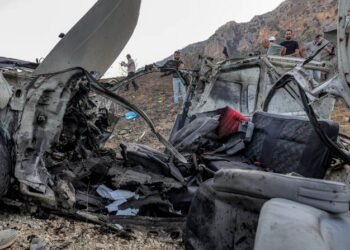By Ghulam Haider
A day after he survived an alleged assassination attempt, maverick cricketer-turned politician and former Pakistan Prime Minister Imran Khan said he knew he was going to be attacked. Imran Khan made the remarks in a video address from Shaukat Khanum Hospital as he sat in a wheelchair with his plastered leg on Friday.
“I knew before the rally that I will be attacked. Four bullets fired at me to kill me either in Wazirabad of Gujrat. I was hit by 4 bullets,” said Imran. “I have come from among the common people, my party wasn’t made under a military establishment. I have struggled for 22 years,” he added.
“That day when I was in the container, I was suddenly hit by bullets in my legs and I started falling down. There were two people, if they would have synchronised then I wouldn’t have been saved,” Mr. Khan added.
“Four people plotted to kill me behind closed doors. I’ve a video with me, if something happens to me, the video will be released,” he claimed.
Former Pakistan Prime Minister Imran Khan on Friday said he was hit by four bullets on his right leg during the assassination attempt a day earlier, when he was leading a political march in Punjab province.
“I’ll come to the details of the attack later. I got to know the day before [the attack] that either in Wazirabad of Gujrat, they planned to kill me,” the 70-year-old chief of the Pakistan Tehreek-e-Insaf party claimed.
Imran especially urged Chief of Army Staff (COAS) General Qamar Javed Bajwa to hold “black sheep” in his institution accountable.
Dr Faisal Sultan, who is treating the cricketer-turned-politician, said x-rays of Khan’s right leg showed that his tibia was damaged and in fact fractured. “In this scan, the line you see on right leg is the main artery. The bullet fragments were very near it,” Sultan said.
Earlier, Mr. Khan accused Pakistan Prime Minister Shehbaz Sharif, Interior Minister Rana Sanaullah, and Major General Faisal for the attack at his rally. Mr. Khan received bullet injuries in his legs after two men opened gunfire during his long march on Thursday’s attack.
Imran Khan’s anti-government march to Islamabad took a tragic turn on Thursday, November 3, when the 70-year-old former Pakistani prime minister was shot at in the city of Wazirabad, Punjab. Mr. Khan, who had been speaking to the crowd from the top of a container when he was shot in the shin, is no longer in danger but the attack could further aggravate the political crisis and instability that Pakistan has been experiencing for the past six months. Earlier in the day, clashes were reported across the country as protesters attacked military symbols.
Protests
Supporters of former Pakistani prime minister Imran Khan staged nationwide protests on Friday, a day after he survived what his aides said was an assassination attempt, blocking key roads in major cities and sometimes clashing with security forces.
Khan’s party called for the protests to continue until its demand for political change in Pakistan is met, a close Khan aide said. Shahbaz Sharif led a coalition of parties that removed Mr. Khan from power through a parliamentary vote in April.
Khan’s supporters began gathering early on Friday at the place where he was shot and urged the former premier – known by millions around the world as a former star cricket player and captain of the national team – to resume his march on Islamabad. In the eastern city of Lahore, where Khan is undergoing treatment, groups of protesters numbering hundreds in each of 10 separate locations burnt tyres and blocked major roads.
They also gathered outside the fortified office of the Punjab provincial governor and pelted the gate with stones, destroying security cameras and barriers, witnesses said.
Local television channels showed police using tear gas in Islamabad to disperse protesters who had blocked roads. Protesters also blocked roads in the north-western city of Peshawar and in Karachi in the south. People chanted slogans as they condemned the shooting incident on a long march held by Pakistan’s former Prime Minister Imran Khan in Wazirabad
Police – who are yet to lodge a case or issue a preliminary report on the attack, which occurred in a region where Mr. Khan’s party is in government – have cordoned off the area and worked through the night to gather evidence.
The vehicle Mr. Khan was travelling in remained parked at the site, a busy street in Wazirabad about 200 km (120 miles) east of Islamabad. Some shops there had reopened by early Friday but there was an air of apprehension.
Prime Minister Shahbaz Sharif has called for a transparent inquiry into the shooting.
Earlier, Khan accused Pakistan Prime Minister Shehbaz Sharif, Interior Minister Rana Sanaullah, and Major General Faisal for the attack at his rally. Mr. Khan received bullet injuries in his legs after two men opened gunfire during his long march on Thursday’s attack.
The Punjab police said that seven people were injured and one person was killed during the attack. It added that a suspect has been arrested. Senior PTI leader Asad Umar in a video statement said that party chairman Imran Khan has named three suspects who could be behind the attack.
“Imran Khan called us and told us to convey this message to the nation on his behalf… He said that he believes three people – Prime Minister Shehbaz Sharif, Interior Minister Rana Sanaullah and Major General Faisal (Naseer) – were involved in the attack on him,” Umar said.
He said they should be immediately removed from their current positions. Mr. Khan has warned that “a protest will be held across the country” if the individuals accused by him were not removed from their offices, Umar added.
Sheikh Rashid, former interior minister and Khan’s close aide, has blamed the Shehbaz administration for allegedly hatching a conspiracy to kill the former premier.
“The federal government hatched a conspiracy to kill Imran Khan. Hired assassin (federal Interior minister) Rana Sanaullah and the federal government has brought the country at the brink of civil war. It can’t stand before the sea of people as it has to go home,” Rashid said. He also announced protest against the assassination attempt on the life of Khan on Friday in Rawalpindi.
Meanwhile, the Human Rights Commission of Pakistan (HRCP) has said that the attack on Khan must be unequivocally condemned. “All political parties have the right to hold peaceful assemblies and to expect security from the state when doing so.”
Pakistani politics has become increasingly nasty and vindictive, with several top PTI figures arrested and intimidated over recent months, while Mr. Khan himself has been slapped with various charges—including terrorism, over comments deemed threatening he made to the judge and senior policeman responsible for the arrest of an aide—that he claims are politically motivated.
In the meantime, the nuclear-armed nation has been blighted by runaway inflation that reached 26% in October and floods that inundated one-third of the country, claimed over 1,700 lives, and caused an estimated $40 billion in damage. It’s striking that given Pakistan’s economic crisis, given these terrible floods, the government has continued to target Khan and its supporters with retributive politics.
Still, Khan was guilty of needlessly antagonistic behavior before his own toppling, denouncing political rivals as “traitors” and taunting the powerful military—which has ruled Pakistan for half its 75-year existence—as “neutrals,” in a sardonic reference to their historical role as kingmaker.
Not that Pakistan’s problems would be over should Khan return to power. His first term was blighted by entrenched polarization and economic mismanagement compounded by global headwinds like the pandemic and soaring oil prices.
Baseless accusations by Imran unacceptable, uncalled for: ISPR
The inter-Services Public Relations (ISPR) late on Friday rejected the “baseless and irresponsible” allegations by PTI Chairman Imran Khan against the military.
Imran was shot at and injured on Thursday evening when the container carrying the PTI chief and senior party leaders, was sprayed with bullets when the party’s ‘Haqeeqi Azadi’ march reached Wazirabad’s Allahwala Chowk.
The former premier has held Prime Minister Shehbaz Sharif, Interior Minister Rana Sanaullah and a senior intelligence official as being responsible for the bid to assassinate him and demanded they resign.
“The baseless and irresponsible allegations by chairman PTI against the institution and particularly a senior army officer are absolutely unacceptable and uncalled for,” the ISPR said in a statement issued hours after Imran’s address.
“The Pakistan army prides itself for being an extremely professional and well-disciplined organisation with a robust and highly effective internal accountability system applicable across the board for unlawful acts, if any, committed by uniformed personnel,” it said.
“However, if the honour, safety and prestige of its rank and file is being tarnished by vested interests through frivolous allegations, the institution will jealousy (sic) safeguard its officers and soldiers no matter what.
“The baseless allegations hurled at the institution/officials today are highly regrettable and strongly condemned. No one will be allowed to defame the institution or its soldiers with impunity,” the ISPR statement added.
The ISPR called on the government to investigate the matter and initiate legal action against those “responsible for defamation and false accusations against the institution and its officials without any evidence whatsoever”.







 United Arab Emirates Dirham Exchange Rate
United Arab Emirates Dirham Exchange Rate

